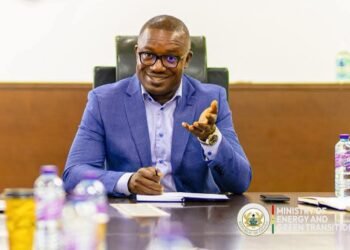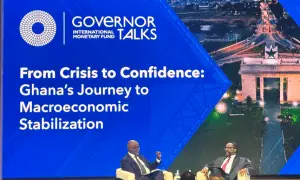President John Dramani Mahama has outlined a bold and inclusive vision for Ghana’s economic recovery and transformation at the 2025 edition of the Kwahu Business Forum in Mpraeso, in the Eastern Region.
Speaking under the theme “The Future of Business: The Role of the Financial Sector,” President Mahama presented a comprehensive strategy that seeks to reposition the financial sector to serve the real economy while making room for innovation, inclusivity, and job creation.
“This year’s theme, The Future of Business, the Role of the Financial Sector, could not be more relevant. The financial sector is the bloodstream of any economy. Without it, businesses cannot grow and jobs cannot be created, and innovation cannot thrive”.
President of Ghana, HE John Dramani Mahama
The Kwahu Business Forum has grown into a significant platform for national dialogue on entrepreneurship and investment, and President Mahama used the occasion to reaffirm his commitment to building a resilient, inclusive, and productive Ghanaian economy.
Addressing the current economic landscape, President Mahama acknowledged the severe hardships that businesses and households have endured in recent years.
He noted Ghana’s challenges in recent years: soaring inflation, a weakened Cedi, rising debt levels, and a decline in investor confidence.
However, he expressed cautious optimism, citing early signs of macroeconomic stability—declining inflation, a steadying currency, and an emerging sense of fiscal discipline.
“But ladies and gentlemen, recovery alone is not enough. We must now set our sights higher on transformation of the economy.
“We must build an economy that is resilient, inclusive and productive, and this cannot be achieved without a financial sector that works not just for a few but for every Ghanaian business, from the roadside vendor to the massive industrialist”.
President of Ghana, HE John Dramani Mahama
President Mahama’s vision of economic transformation centers on a deliberate and multi-sectoral strategy.

He announced plans to target sectors capable of absorbing labor and sustaining growth, such as agro-processing, ICT, tourism, manufacturing, renewable energy, and the broader green economy.
Empowering Local Entrepreneurs
Beyond attracting foreign investment, President Mahama underscored the need to empower local entrepreneurs.
“We are equally committed to empowering Ghanaians to become owners and drivers of enterprise”.
President of Ghana, HE John Dramani Mahama
To that end, he outlined a slew of measures to support Ghanaian businesses. These include improving access to affordable credit through institutions like the Ghana Development Bank and the yet-to-be-launched Women’s Development Bank.
He promised targeted financing and tax incentives for small and medium enterprises (SMEs), as well as technical assistance and business advisory services to help them scale.
President Mahama was critical of the current cost of borrowing and called for a reformed credit system that facilitates rather than inhibits private sector growth.
He also announced the establishment of a national venture capital fund focused on youth- and women-led businesses, alongside regulatory reforms to encourage banks and other financial institutions to lend to productive sectors.
A key pillar of President Mahama’s vision is financial inclusion. “No economy can grow if its people remain excluded from the formal financial systems,” he asserted.

He pledged to expand access to financial services in rural and underserved areas through collaboration with banks, fintechs, and mobile money operators.
President Mahama also spoke about the importance of modern infrastructure and digital transformation in shaping Ghana’s future economy.
“As part of our twenty four hour economic strategy, we will create the conditions through reliable electricity supply, logistics and public safety for businesses to operate around the clock. This will boost productivity, create jobs and expand opportunities across the country.”
President of Ghana, HE John Dramani Mahama
Another crucial element of his strategy is a “Jobs and Skills Compact” that will bring together government, industry, and academia to align education with market needs.
President Mahama said the initiative will create incentives for companies to offer sustainable, decent jobs and promote youth entrepreneurship.
“Our vision is of a Ghana where no young person needs to leave their hometown in search of opportunity,” he said, highlighting his ambition to decentralize innovation and enterprise.
The President also addressed the broader systemic and governance issues needed to support business growth.
He called for stronger rule of law, political stability, and protection of property rights as prerequisites for economic transformation.

He also emphasized the need for a responsive and corruption-free public service that views the private sector not merely as a source of tax revenue but as a partner in national development.
“This forum is not just an event—it is a call to action. The future of Ghana will not be determined by government alone. It will be determined by our ability to build partnerships between the state and private sectors, between finance and innovation, and between leadership and the people.”
President of Ghana, HE John Dramani Mahama
He closed by formally declaring the 2025 Kwahu Business Forum open and expressed his hope for a collaborative, inclusive, and forward-looking approach to building a new economic future for Ghana.
President Mahama’s address marked a compelling attempt to redefine the country’s development narrative, placing strong emphasis on innovation, partnership, financial accessibility, and homegrown enterprise.
READ ALSO: Defence Minister Vows Crackdown on Galamsey Kingpins























